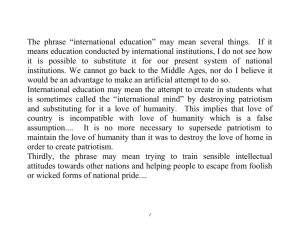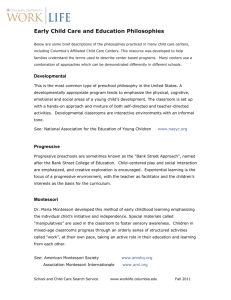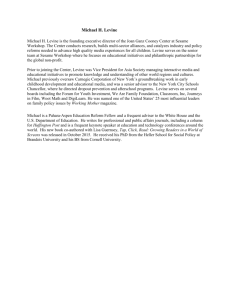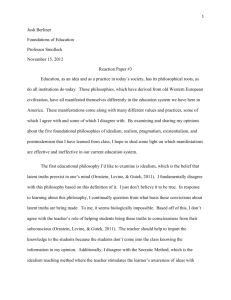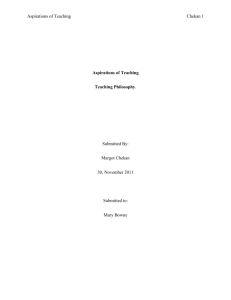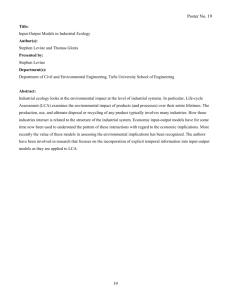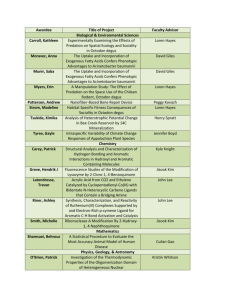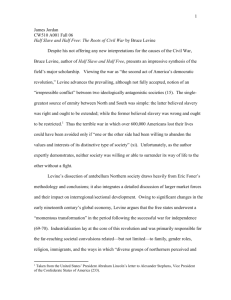Reaction Paper #3
advertisement
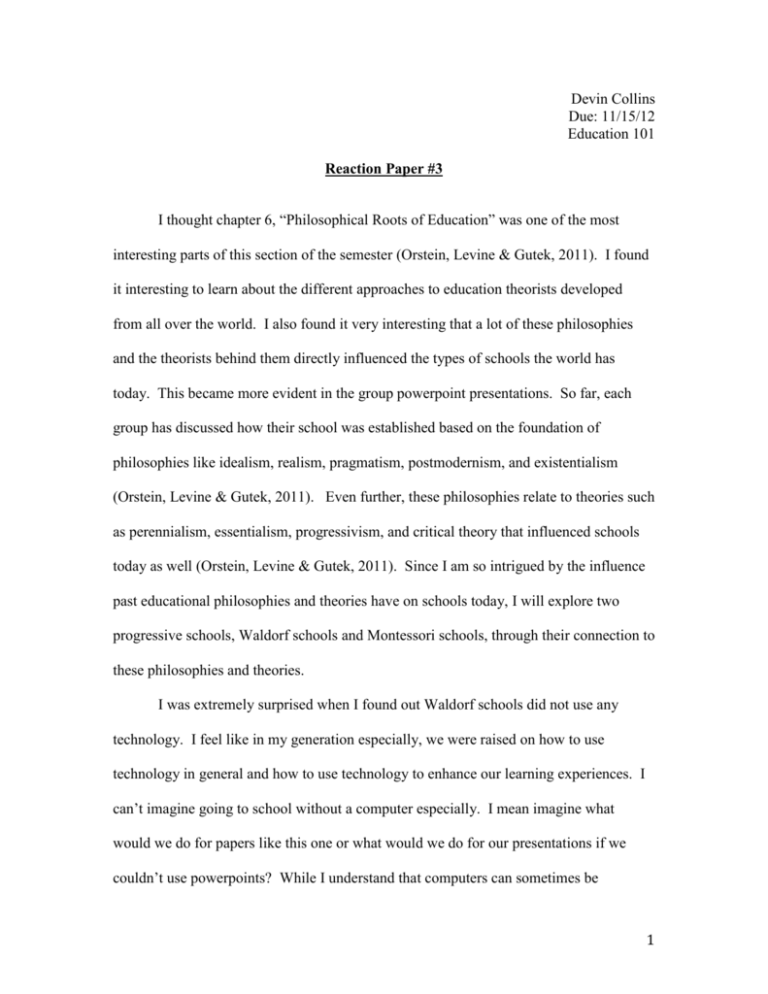
Devin Collins Due: 11/15/12 Education 101 Reaction Paper #3 I thought chapter 6, “Philosophical Roots of Education” was one of the most interesting parts of this section of the semester (Orstein, Levine & Gutek, 2011). I found it interesting to learn about the different approaches to education theorists developed from all over the world. I also found it very interesting that a lot of these philosophies and the theorists behind them directly influenced the types of schools the world has today. This became more evident in the group powerpoint presentations. So far, each group has discussed how their school was established based on the foundation of philosophies like idealism, realism, pragmatism, postmodernism, and existentialism (Orstein, Levine & Gutek, 2011). Even further, these philosophies relate to theories such as perennialism, essentialism, progressivism, and critical theory that influenced schools today as well (Orstein, Levine & Gutek, 2011). Since I am so intrigued by the influence past educational philosophies and theories have on schools today, I will explore two progressive schools, Waldorf schools and Montessori schools, through their connection to these philosophies and theories. I was extremely surprised when I found out Waldorf schools did not use any technology. I feel like in my generation especially, we were raised on how to use technology in general and how to use technology to enhance our learning experiences. I can’t imagine going to school without a computer especially. I mean imagine what would we do for papers like this one or what would we do for our presentations if we couldn’t use powerpoints? While I understand that computers can sometimes be 1 distracting, I think learning how to use them in schools is actually very helpful to do things faster, have better records of papers and assesments, and teach students skills for the workforce. How do Waldorf schools relate to the philosophies and theories? Since Waldorf schools don’t use technology, they focus more on nature and art that coincides with the philosophy of idealism, and the theory of perennialism (Orstein, Levine & Gutek, 2011). Both of these put a high focus on the arts, creativity, and classic art and literature. The idea of the imagination goes along with the connection of these two also, because to be creative and artistic, one must use his/her imagination. Another trait of idealism that Waldorf schools focus on through lessons on nature is the Socratic method (Orstein, Levine & Gutek, 2011). This method focuses on the learner’s awareness of ideas by having them ask leading questions (Orstein, Levine & Gutek, 2011). The idea of leading questions connects Waldorf schools also to the philosophy of realism (Orstein, Levine & Gutek, 2011). Realism embodies the ideals of object lessons and connections to nature, both of which Waldorf schools stress (Orstein, Levine & Gutek, 2011). Waldorf schools are considered to be less rigid schools because they promote a non-discriminatory approach to learning. This is directly connected to post-modernism (Orstein, Levine & Gutek, 2011). Waldorf schools try to eliminate inequalities within the school through the post-modernist approach. Similarly to that, critical theory comes into play here. Waldorf schools embody the influence of critical theory by evening out these inequalities with well-planned groups (Orstein, Levine & Gutek, 2011). Lastly, Waldorf schools are considered to be progressive schools. They use the idea of progressivism, like Montessori schools, to focus on the needs of the student 2 (Orstein, Levine & Gutek, 2011). Through group activities and projects, Waldorf schools hope to center learning around the student, with the student being the focus of the curriculum (Orstein, Levine & Gutek, 2011). They also teach the ideals of inquiry learning through these group activities. Like Waldorf schools, Montessori schools also are considered progressive schools. What initially surprised me about Montessori schools was how the schools are so focused around the students. I actually really like this because I think it is important for schools to be more focused on the students, rather than things like state tests. This idea directly relates Montessori schools to pragmatism (Orstein, Levine & Gutek, 2011). Pragmatism is based around educating individuals based on their needs, using the scientific method in the classroom, group work and solving problems, and the school representing a community of learners (Orstein, Levine & Gutek, 2011). Pragmatism is very closely tied to the theory of progressivism (Orstein, Levine & Gutek, 2011). Again, the idea of progressivism touches upon children learning most successfully by actively exploring their environment and constructing their own opinions based on their experiences (Orstein, Levine & Gutek, 2011). Teachers at Montessori schools also inhabit a very progressivist trait of developing sincere affection and interest towards their students. Montessori schools differ from some of the more subject-based schools because they have looser, student-based curriculums that are centered on the children’s readiness and interests. Laslty, Montessori schools could be connected to the philosophy of existentialism because existentialist teachers encourage students to question and discuss their emotions, like Montessori teachers do (Orstein, Levine & Gutek, 2011). 3 My high school experience was definitely more a subject-based school experience than a student-based school experience (Orstein, Levine & Gutek, 2011). So unfortunately, I did not get to experience anything like the Waldorf or Montessori schools. While in a way I like the structure that my public high school provided for me in terms of classes, I do wish that I could have a little more choice in my classes, instead of just being put into a class. I got a little more choice than usual senior year in terms of being able to take extra classes like econ, psychology and certain science electives, but I still had to have certain grades to be allowed to take those classes. What I love about college is that it is based around students taking classes that interest them. Although there are some course requirements, I can still take pretty much whatever I want to take. When I become a teacher, I hope I get the chance to work at a more progressive school, so that I know what I am teaching the kids is something they are interested in. Or if I do work at a public school that has a more rigid curriculum, maybe I could try to take some steps to make it a little more progressive. I think it would be ideal to have a mix between student-centered and subject-centered curriculum (Orstein, Levine & Gutek, 2011). It would also be ideal to have a school based off of a mix between realism, and progressivism and pragmatism. That way there would be some structure for classes and teachers in certain areas of education, but there would also be some opportunity for the students to have the ability to choose some classes that interest them. 4 Works Cited Ornstein, A.C., Levine, D.U., & Gutek, G.L. (2011). Foundations of education. (11th edition). Belmont, CA: Wadsworth 5
